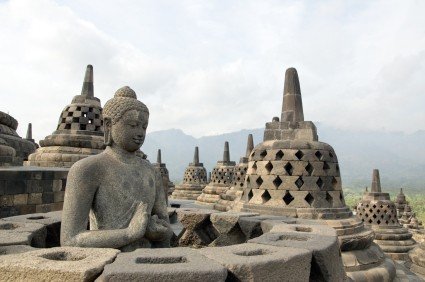May 8, 2012
Jakarta, Indonesia
If you swallow the line parroted by the mass media in the West (my adopted country of Australia being the prime offender), you’d think Indonesia was a strict Islamic state where terrorists run around bombing nightclubs frequented by tourists.
And you probably have a mental image of an economic backwater reliant on exports of natural resources such as coal and palm oil to pay its bills.
Rubbish.
Toss all your clichéd, preconceived assumptions about Indonesia out of the window immediately.
Jakarta, Indonesia’s capital city, is a modern, sophisticated metropolis populated by friendly, tolerant people of many cultures and religions.
The world’s biggest Buddhist temple is in Indonesia. There are more Christians here (28 million) than the entire populations of Australia and New Zealand combined.
Oh, and there are more registered users of Facebook than in almost every other country in the world! Not exactly the hotbed of ultra-conservative Islam.
More broadly, Indonesia is already the third-biggest market in Asia after China and India, with 240 million people. In seven of the past eight years, its economy has grown by more than 5%. On current growth rates, it’s doubling every 11 or 12 years.
“Growth slows in 1st Quarter,” read the headline in the paper this morning. Yeah. From 6.5% the previous quarter, to 6.3% in the quarter ended March 31st. Boo hoo.
There’s not a single economic policymaker in the West who wouldn’t kill for economic growth like that. But in Indonesia, the figure was mildly disappointing.
As Simon and I frequently point out, though, the official statistics are usually worthless… you have to trust what your eyes and ears tell you on the ground. And the reality certainly backs up the figures—Indonesia is buzzing.
This is clearly a place that’s on the rise. It’s already almost a trillion-dollar economy. Fifty percent of the population is under the age of 30 and yet to enter their peak working and consuming years.
Millions of new workers enter the labor force each year. Yet, unemployment is falling… to 6.3% on the most recent statistics, down from 6.8% 12 months before.
Indonesian wages are lower than they are in China now (US$160 a month is typical), and there are many multinational companies starting to relocate production here.
The engine room of the Indonesian economy is NOT low-value-added exports of natural resources. It’s domestic consumption demand, which accounts for 53% of the economy; and, investment, which accounts for 32% of GDP.
What’s more, policymakers are cognizant that adding value to the country’s natural resources at home, before exporting them, could be another important driver of growth.
Indeed, Indonesia has just imposed duties on the export of most raw metal ores. The duties do not apply to refined products, and are designed to encourage investment in domestic treatment and refining facilities.
It may or may not work. But, let’s face it—there are worse problems to have than figuring out what to do with an abundance of raw materials.
This, combined with a young and growing labor force, as well as room for great improvement in its infrastructure, are all good reasons to be bullish on the long-term economic future of Indonesia.
Moreover, from what I’ve seen so far, the rampant credit creation and likely overbuilding that characterize the sky-lines in places such as Manila and Bangkok right now, are not evident in Jakarta. At least not yet…








